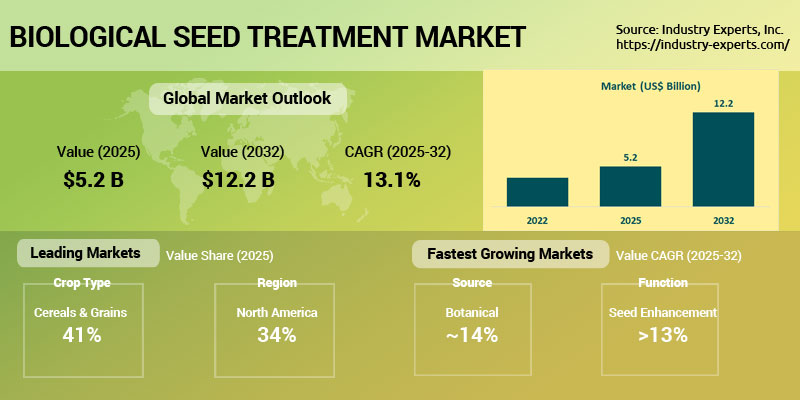Global Biological Seed Treatment Market to Reach US$12.2 Billion by 2032 | Industry Experts, Inc.
Industry Experts, Inc. has unveiled its latest market research report, "Global Biological Seed Treatment Market - Sources, Functions and Crop Types," estimating that worldwide revenues will increase from US$5.2 billion in 2025 to US$12.2 billion by 2032, registering a CAGR of 13.1% during 2025 to 2032. Growth is supported by the global shift toward sustainable and organic farming, rising demand for chemical-free produce, and regulatory encouragement for reducing chemical pesticide usage. The expanding use of beneficial microorganisms and bio-based compounds to improve germination, nutrient uptake, and stress tolerance is reshaping modern seed treatment practices.
Advances in microbial formulation, seed-coating technologies, and precision agriculture are enhancing performance, enabling targeted delivery of beneficial agents and optimizing early-stage plant health. Farmers are increasingly adopting bio-based solutions to combat soil degradation, pest resistance, and climate variability. These treatments promote stronger root and shoot systems, boost nitrogen fixation, and reduce dependence on synthetic fertilizers, aligning productivity with environmental stewardship.

Regionally, North America leads with a 33.7% share in 2025, driven by high technology adoption, large-scale corn cultivation, and substantial R&D investment. The Asia-Pacific region will grow the fastest, registering a CAGR exceeding 14% through 2032, supported by sustainable farming initiatives across China, India, and Japan, rising food demand, and government programs aimed at minimizing chemical inputs and enhancing soil health.
By source, Microbial treatments dominate with a 63.2% share in 2025, driven by the proven benefits of bacteria and fungi such as Rhizobia, Bacillus, and Trichoderma in improving soil fertility and crop health. Botanical treatments will post the fastest 13.7% CAGR, supported by rising adoption of neem, garlic, and other plant extracts. By function, Seed Enhancement leads with a 52.4% share in 2025 and a 13.3% CAGR, driven by wider use of biofertilizers and biostimulants, while Seed Protection continues to gain ground through rising demand for biofungicides and bioinsecticides.
Among crop types, Cereals & Grains hold the largest share at 41% in 2025, supported by adoption across wheat, corn, rice, and barley to improve yield and reduce fungal infection. Fruits & Vegetables will grow the fastest at a 14% CAGR, driven by increasing consumer preference for residue-free produce and expansion of organic and protected cultivation systems.
The report segments the global Biological Seed Treatment market by source (microbial, botanical, other sources), function (seed protection, seed enhancement), and crop type (cereals & grains, oilseeds & pulses, fruits & vegetables, others). Geographic coverage spans North America, Europe, Asia-Pacific, South America, and Rest of World, with analysis of over 13 companies, including BASF SE, Bayer AG, Corteva, Syngenta AG, Valent BioSciences LLC, Koppert B.V., and Verdesian Life Sciences LLC.
For sample pages or purchase options, contact +1-320-497-3787 or visit Biological Seed Treatment Market Report.
About Industry Experts, Inc.
Industry Experts, Inc. ranks among the leading market research providers globally. The company's off-the-shelf and customized business intelligence reports offer strategic insights and valuable guidance to enable various stakeholders, including corporate strategists, analysts, researchers, and startups, in obtaining unbiased current and future market data. For more information, contact +1-320-497-3787 or visit https://industry-experts.com.



Comments
Post a Comment